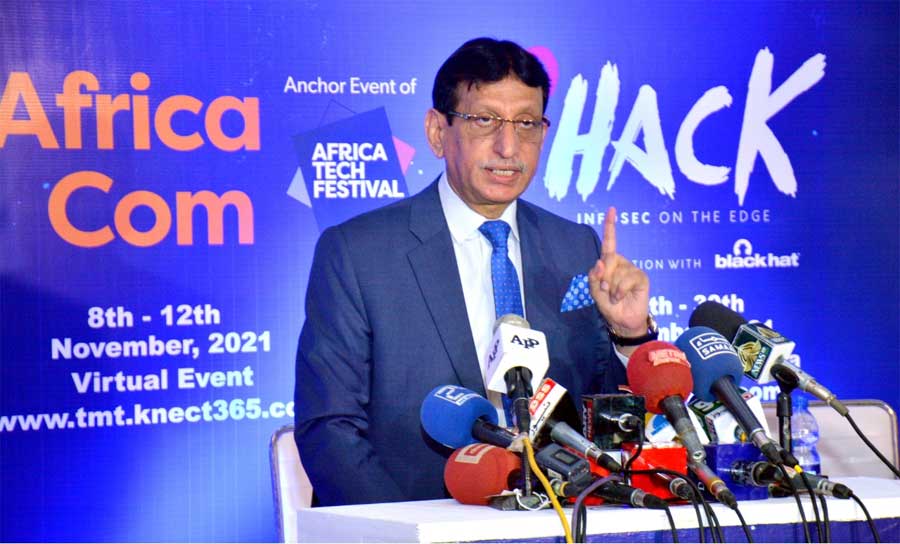
Imran Zakir
KARACHI: Federal Minister for Information Technology and Telecom (MoITT), Syed Aminul Haque stressed on the significance of Cyber Security and its critical importance for Digital Pakistan in his address as the chief guest at two-day event “Cyber Security Hackathon” held here at a local hotel, Monday. The event was organized by MoITT and was attended by Member IT Ignite Syed Junaid Imam, CEO Ignite Asim Shehryar, cyber security experts and large numbers of people from the IT sector and academia.
Addressing the audience Aminul Haque said that the purpose of the “Cyber Security Hackathon 2021” is to train and prepare cyber security experts in Pakistan under the country’s first cyber security policy issued by the MoITT on 27 July 2021 and the Government has to take up Cyber Security as a challenged because “Cyber power will be considered as the Super Power” in today’s world.
He said that we are in the dire need for Cyber Security experts and from this Competition the successful cyber security experts will not only receive huge cash prizes but also become a part of the Computer Emergency Response Team (CERT) that will be formed on national level and NCERT will respond with immediate effect and later on CERT for Defence sector, Public sector, Private sector, Banking & Telecom Sector will be formed, we are in the process of formulating the CERT rules after consultation with all stakeholders.
Discussing about the cyber-attacks on our Public and Private sector, Aminul Haq revealed that, a few weeks ago, the FBR website was hacked and the most important data was compromised. In June this year, Pakistan’s leading musical streaming website “Patari” was cyber-attacked and hackers released data on 257,000 users on the Dark Web. Last year, K-Electric’s system was hacked and ransom demanded. The 8.5 GB data of millions of users was posted on the dark web due to non-payment. The data of Meezan Bank, Bank Islami was hacked also.
He said the Ministry of IT which have the best Cyber Security experts informed the Private sector about the up-coming cyber-attacks and suggested preparedness for them. “The online taxi service ‘Careem’, Peshawar ATM Services, Sindh High Court, PTV Sports and many other institutions were hacked and the latest attack was on the data of the National Bank” and the whole banking system is not working today and now NBP is striving for the damage control.
He also said that institutions still do not follow the instructions of the Ministry of IT and bear irreparable damages from cyber-attacks. Many institutions do not even have cyber security systems, he revealed.
Moreover, Aminul Haque highlighted the discrimination of Sindh government policies that after 18th Amendment Sindh government is responsible to provide mass transportation and drinking water to the province but we are thankful to our Prime Minister Imran Khan who came to the rescue of Karachiites and resolving these two critical issues; the inauguration of Green Line (KCR Project) will take place during the month.
He said the MoIT provided the broad band connectivity and 4G services in under privileged areas of Sindh and even in the C.M Sindh Murad Ali Shah’s constituency in Dadu also. We always tried to join hands but they always refuse to work together, he complained.
Discussing about the future targets 2023, he said that we will achieve $ 6 to 7 billion from IT Industry.
Earlier in his welcome address, Asim Shehryar CEO Ignite shared his strategic vision for Digital Pakistan and said the growing importance of cyber security has placed it at number 7 among 21 future sustainable technologies with a growth projection of $270 billion by 2026.
Junaid Imam Member IT, Dr. Slahuddin Shamsuddin CTO Malaysia and Mehzad Saha CISO Engro discussed enhancing Cyber Security readiness and response.
A panel discussion was also held on “National Preparedness of Cyber Security Challenges” moderated by Hassan Husseini (G.M & Head IT Audit HBL) and the panelists were: Asad Arfeen (Director IT NED University), Athar Ahmad (Habib Metro Bank), Asif Riaz (Digital-Array) and Farooq Naiyer (CISO-UBL) and Rafi us Shan (MoITT).






